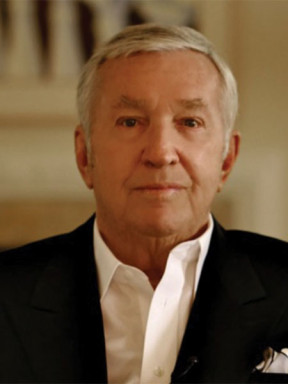Robert M. Bennett of Newport Beach, CA ranked among the nation's most accomplished broadcasters over a 50-year career that was capped by election to the prestigious Broadcasting and Cable Hall of Fame.
He died November 29, 2016 at Hoag Hospital, Newport Beach, CA, after a long illness.
He entered the Hall of Fame in 1994, joining such distinguished media notables as Diane Sawyer, Merv Griffin, and Edward R. Murrow
At the pinnacle of his tenure in the industry in the early to mid-1980's, Bob Bennett guided the nation's then-largest broadcast station group as President of Metromedia Broadcasting and as a partner and member of the office of the President of Metromedia Inc. with legendary media tycoon John Kluge.
The Metromedia entertainment empire included television stations in New York, Los Angeles, Chicago, Boston, Houston, Dallas, and Washington, D.C., as well as 13 AM/FM radio stations in ten major metropolitan areas, Harlem Globetrotters, Ice Capades, and Metromedia Producers, which distributed virtually all of famed producer Aaron Spelling’s television series, along with Metromedia’s own network movies-of-the-week and award-winning mini-series. In his first year as head of Metromedia Broadcasting, the company’s stock rose from $45.00 per share to more than $500 per share, the highest price then recorded on the New York Stock Exchange.
He championed and captained the launch of such nationally successful shows as "Fame," "Three's Company," "Small Wonder," and "Star Search."
Initially identified as the Metromedia Network, the lineup of stations carrying these and other programming from Metromedia in 1983-85 three nights per week basically constituted what later became known as the "Fourth Network." When Rupert Murdoch acquired Metromedia in 1985 he and Fox president Barry Diller utilized the core strength of the Metromedia stations and its already-existing lineup of primetime programs and affiliates to form the Fox Network.
Bennett served as the point man for Metromedia's multiple public and private equity placements, and, in 1982, Bennett, Kluge, and two other partners took the company private in what was then recognized as the world's largest leveraged buyout.
Bennett began his broadcasting career in 1952 as a salesman at KTTV-TV, Los Angeles, and, from 1958 to 1966, as Vice President and Director of Sales. Rising through Metromedia's broadcast division, he served as Vice President and General Manager of its TV station (WTTG-TV) in Washington, D.C., and, from 1969 to 1971, the country's largest and most successful independent station, WNEW-TV, New York.
In 1972, the Federal Communications Commission, for the first time in its history, awarded a television license to a new group of operators in Boston, and Bob Bennett, among a field of elite candidates, was selected to lead the group. He emerged as that station's principal architect, builder, manager, and owner. WCVB-TV, from the start, was conceived as a model of what local television broadcasting could be in America. It produced more than 60 hours of locally produced programming at a time when most stations were content simply to run local news and occasional documentaries.
Among WCVB-TV's award-winning original productions were: an ABC Network movie, "Summer Solstice," set in a picturesque New England community and starring Henry Fonda (in his last film appearance – subsequent to Fonda's Academy Award-winning lead role in "On Golden Pond") and Myrna Loy; a situation comedy ("The Baxters") developed for national syndication with legendary Hollywood television producer Norman Lear (of "All In the Family" fame); another situation comedy ("Park Street Under," which was set in a subway bar in Boston and followed the lives of an ex-Red Sox pitcher as bartender, an outspoken waitress, et al.) from which Paramount Television and the NBC Network reportedly developed its long-running hit "Cheers;" and more than 200 national and international award-winning documentaries, dramas, and magazine/talk shows.
WCVB-TV, which received the prestigious Peabody Award as America's finest television station, was sold in 1981 to Metromedia for $220 million, eclipsing the highest price ever paid for a television station in the country. It became the flagship station for the Metromedia broadcasting group. In 1985, Bennett arranged and directed the sale of WCVB-TV to the Hearst Corporation for $450 million, which was then cited as the new high-water mark for any television station sale in the U.S.
In the early 1980s, he guided the nascent New England chapter of the National Academy of Television Arts & Sciences as its founding president.
The recipient himself of many awards recognizing his personal contributions to the field, Bennett, in 1985, was presented one of the broadcast industry's highest honors, the President's Award of the National Association of Television Program Executives (NATPE). Therein, he was cited as "a distinguished, inspired, dedicated leader...willing to take a chance, a man who encourages his colleagues to experiment, to try new ideas, even to risk failure."
WCVB-TV was recognized in 1981 by The New York Times as "probably America's best television station."
He was a member of Bel Air Country Club in Bel Air, CA, where he met and played with champion golfer Gary Player and teamed with him in a 1989 charity tournament. He was in a match with seven-time grand champion Arnold Palmer in the mid-80's at Wilshire Country Club in Los Angeles, wherein Palmer, one of the best bunker players in the game, advised him on the 18th hole how to hit out of a difficult bunker: "Pretend you're pitching an underhand softball with your swing." That allowed Bennett to par the hole.
Until his death, Bob Bennett served as Chairman of the Board of Bennett Productions in Los Angeles, CA, one of the country's leading high definition television production and post-production companies. He and his son, Casey, founded the company nearly 30 years ago. Its introduction of a weekly television series, "The Extremists," in 1991 marked Bennett Productions as the generally- recognized pioneer of extreme sports television coverage in the world. The company produced and distributed worldwide 88 half-hour episodes of the original series, along with more than 300 hours of other programming. Bennett Productions later developed its own digital channel, Edge TV.
Bennett began his broadcasting career in 1948 as a page at CBS Radio in Hollywood, where he met and married his wife, Marjie Bennett, for whom the CBS hit comedy, "My Little Margie," was named. At that time, he worked with his friend of 70 years, the late Dale Sheets, who later was joined by Bob in sales at KTTV-TV in Los Angeles before a long stint as an executive at Universal Studios and owner of a talent management company.
Bennett is a past president and board member of the Muscular Dystrophy Association, which had telecast the Jerry Lewis MDA Telethon every Labor Day weekend to millions of U.S. homes and which had administered more than $2.5 billion to that charity's young MD-afflicted beneficiaries until the television program's expiry in 2014. When Bob was general manager of WNEW-TV in New York which was the only station then carrying the MDA Telethon, he contacted his many peers in the business and convinced them to carry the weekend-long program. That led to the formation of Lewis' national MDA Network.
He also served on the boards of publicly traded NTN Communications, Inc. (now NTN Buzztime) of Carlsbad, CA, a leader in video gaming; the American Film Institute; the Visiting Committee of the UCLA School of Medicine; and two New England colleges (Bryant College and Stonehill College) which awarded him honorary doctorate degrees.
As a major philanthropist, significant donations in his and wife Marjie's names have been made over the past 30 years to MDA, American Film Institute, the Hoag Hospital of Newport Beach, CA, a railroad museum in Altoona, PA in honor of his grandfather, who was a pioneering engineer in that industry; and, most recently as February 2023, the National Academy of Television Arts & Sciences. Bob Bennett was born in Altoona, PA in 1927.
From 1985 until his passing, Bob lived in Newport Beach, CA, with his wife, Marjie, who died in 2022. He is the father of daughter Kelly Bennett and grandson, Brandon Bennett, of Santa Monica, CA; and his late son, Casey Bennett.



